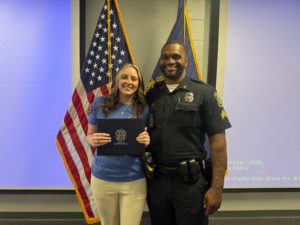This article was originally published by Erin Wickey on UKNow.
LEXINGTON, Ky. (Oct. 28, 2024) — Laneshia Conner, Ph.D., joined the University of Kentucky as an assistant professor in the College of Social Work in 2020. Her primary research focuses on improving scientific knowledge about HIV prevention for older Black women, adult learning principles in higher education and anti-racism in social work education.
But this Halloween season, UK’s “Research Made Possible” podcast explores Conner’s work in the classroom, specifically a course she created called “Horror Films and Social Welfare.” In this course, she and her students explore the use of horror films as a lens to learn about critical social issues.
“I have always liked horror films, they’re something my husband and I share a great love for,” Conner said. “When you think about what scares you and how we construct fear… that’s a really nice segue to break down the ‘why’ behind it.”
The course begins with a focus on history, emphasizing the importance of students gaining a deep understanding of the past.
“We begin by analyzing some early films. I start with D.W. Griffith’s ‘Birth of a Nation,’ a silent film, and then move on to the original ‘Night of the Living Dead.’”
By equipping students with historical knowledge, Conner says they gain the power to critically analyze and reshape their understanding, which is a crucial step toward fostering meaningful change for the betterment of society.
The course then moves across time — the ’70s, ’80s and ’90s — and explores social issues during these time eras, as well as important themes that emerged, from mental health to artificial intelligence to natural disasters.
Conner first pitched the idea of the course in 2021, and there was a strong student interest in the topic. She has now been teaching the course for three years.
“Movies [can create] this ambiance, and [some] people won’t watch horror movies because of what it does — it makes them more fearful,” she said. “So it’s kind of like what comes first, the chicken or the egg? The scary movie, or the fear? And the course has just been so beautiful in helping [students] dissect their feelings about things.”
Listen to the podcast above, or on SoundCloud.
About Laneshia Conner
In 2022, Conner received NIH funding for her research as a UK Building Interdisciplinary Research Careers in Women’s Health (BIRCWH) Scholar. This training program is funded by the Office of Women’s Health Research and the National Institute on Drug Abuse at the National Institutes of Health (NIH).
Conner was recognized earlier this year for her exceptional research achievements by the Society for Social Work and Research. Her study focused on the group experiences of Black faculty supervised by Black administrators, in which participants reported more autonomy and positive interactions, visible supports and understanding from their administrators.
Research reported in this publication was supported by the National Institute on Drug Abuse of the National Institutes of Health under Award Number K12DA035150. The content is solely the responsibility of the authors and does not necessarily represent the official views of the National Institutes of Health.
As the state’s flagship, land-grant institution, the University of Kentucky exists to advance the Commonwealth. We do that by preparing the next generation of leaders — placing students at the heart of everything we do — and transforming the lives of Kentuckians through education, research and creative work, service and health care. We pride ourselves on being a catalyst for breakthroughs and a force for healing, a place where ingenuity unfolds. It’s all made possible by our people — visionaries, disruptors and pioneers — who make up 200 academic programs, a $476.5 million research and development enterprise and a world-class medical center, all on one campus.
In 2022, UK was ranked by Forbes as one of the “Best Employers for New Grads” and named a “Diversity Champion” by INSIGHT into Diversity, a testament to our commitment to advance Kentucky and create a community of belonging for everyone. While our mission looks different in many ways than it did in 1865, the vision of service to our Commonwealth and the world remains the same. We are the University for Kentucky.






